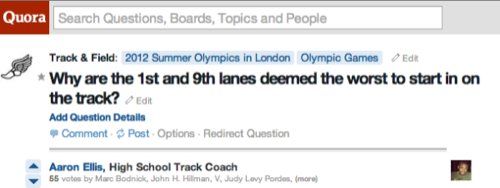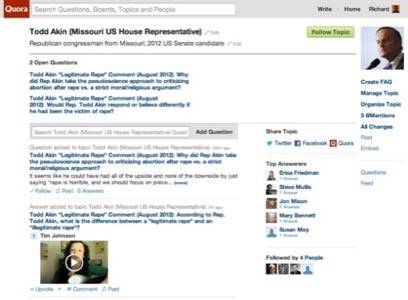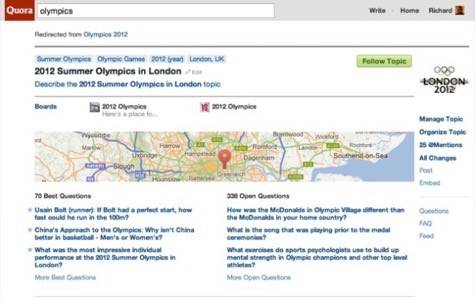
This week I’m exploring why topic pages are getting traction on the social Web. But one potential flaw in topic pages is that they are typically closed networks. Wikipedia, The New York Times, Branch, Medium – these are all tightly controlled, essentially closed knowledge networks. Sure you can wrangle an invite to Branch, or eventually convince a Wikipedia editor not to keep deleting your contributions. But the reason why the controls are there in the first place is to maintain quality. After all, what is a topic page without quality control? (About.com? No, that’s just being mean…). Quora, a Q&A site that is open to anyone to join and participate in, defies the conventional Web wisdom that quality = closed.
There are caveats, however, so let’s start with those. Just like The New York Times, Quora has a topic page for Todd Akin, the Republican congressman from Missouri who caused a media storm with his comments about rape victims.

However, Akin’s topic page on Quora shows a couple of the drawbacks of using Quora for topics. The first is that sometimes there will be far more questions than answers on the page, which is the case with Akin’s topic page. The second drawback is that a topic like Todd Akin will invariably attract a lot of subjective opinions.
This doesn’t mean that Quora is a bad place to go for topical information, but it does tell us that Quora is best suited to factual or knowledge-based topics. Quora is in effect a place for people to show off their expertise on a topic.
This is where Quora becomes a great complement to media and encyclopedia knowledge bases. The New York Times has journalistic expertise, Wikipedia has crowdsourced expertise. Both have excellent topic pages, in large part because they are closed networks and rigorously edited. This is why Branch and Medium are restricting access to their networks, because they have seen this strategy produce quality content elsewhere on the Web.
So why would you need to go to Quora, in addition to Wikipedia or The New York Times? To answer that question, let’s look at this topic: Olympics 2012.

You can read a ton of useful facts and figures about this year’s Summer Olympics on Wikipedia and The New York Times. But you likely wouldn’t find out the answer to this question: why are the 1st and 9th lanes in track and field deemed the worst to start in?
The answer with the most votes in Quora, 55, was by Aaron Ellis, a high school track coach. Here is his abridged answer:
Lane one is viewed as an inconvenience in certain sprint races (mainly the 200m) because sprinters are a bit slower running curves than running straightaways, and the curve in lane one feels like it goes on forever.
[…]Lane nine is viewed as an inconvenience in curved sprints because the athlete can’t see the competition. This is especially true in the 400, where it’s easy to run too fast or too slow in relation to the rest of the pack. For that reason, athletes who are not good at setting their own pace dislike lane nine.
This then is the reason why Quora being open pays off – and why Branch and Medium accordingly might have problems. If Quora wasn’t an open network, the chances are that Aaron Ellis would never have contributed his expertise.
Imagine a Medium “collection” (similar to a topic page) called The Art of Running Track, which doesn’t have the nugget of knowledge about lanes that Aaron Ellis knows – but probably very few others do. Or imagine a Branch thread about track running strategy, but no Aaron Ellis-type experts were invited.
The point is that there is a place for a completely open knowledge network in the world of topic pages. Quora has proven that being open doesn’t diminish quality for many topics. Quite the opposite, in fact.















